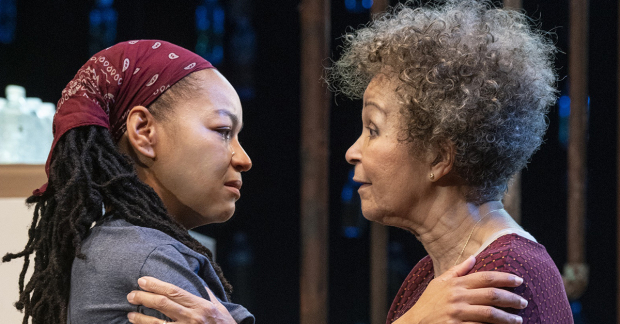Interview: In Cullud Wattah, Crystal A. Dickinson Gets the Challenging Role of Her Dreams
Erika Dickerson-Despenza’s new play follows three generations of Black women contending with the Flint water crisis.
A play that looks at the cost of survival in the face of insurmountable odds is very timely right now, and Erika Dickerson-Despenza's Blackburn Prize-winning play Cullud Wattah at the Public Theater is no different. In the work, three generations of Black women are living through the water crisis in Flint, Michigan, while trying to figure out how to live when everything is at its bleakest.
At the heart is Crystal A. Dickinson as Marion, a third-generation General Motors employee consumed by layoffs at her plant, while her sister seeks justice for lead poisoning. Pre-shutdown, Dickinson was appearing in Will Eno's play Gnit at Theatre for a New Audience. But once everything started to get back up and running, Dickinson felt like she wanted to return to theater with a different experience. Cullud Wattah is what she asked for.
This conversation has been condensed and edited for clarity.

(© Joan Marcus)
This is your first show back since the shutdown. How does it feel?
I feel really proud of the work that I'm doing, but I also feel proud of what we're saying and what we're trying to let people know about. In every way, it feels good — it's not easy to do, but it's rewarding in that respect. The unexpected surprise about it is…With all the talk about the Infrastructure Bill now, part of that is going to cover lead pipes all around our country. The truth is, this is Flint's issue, and Newark's, but there's millions of lead pipes all around the country that are going to need replacing. It's exciting to know that this bill will help take care of that.
How did this come into your orbit?
I had been asked to come back to Gnit [which Dickinson was in pre-shutdown at Theatre for a New Audience], but the place that I was in, I felt like I wanted to do more. I loved the experience of doing Gnit, but after being quarantined at home with my family, I got a greater sense of myself and what I thought was important to do. The next chance I had to do that, I wanted to. I auditioned for Cullud Wattah the day before my birthday in July and it was just serendipitous.
What is it like for you to come back with this group of actors, to do this play, which, as discussed, is so relevant?
These women. Candis C. Jones managed to put together an amazing group of human beings. She and Erika Dickerson-Despenza did a phenomenal job of making an environment in our rehearsal room that was conducive to the work that we were doing. They really emphasize taking care of our minds and our bodies and each other, and allowing room for our experiences and to talk about them. It all helped, I think, to make us open and available to one another and to the text, which is really, really challenging to do.
Can you talk a little bit about that?
The way Erika writes is so beautifully poetic, but it's her own syntax. It's written in the way she wants you to speak. In one line, you might have the word "G-O-N-E." And that would say "You gone be late." Another line you would say, "G-O-N-N-A." "You gonna try me one time and then that's gonna be it." You have these pauses and shifts and overlaps. It's like a very complicated musical score. You have that challenge.
And then there's the emotional weight. This family is a fictional family, but there are people in Flint, Michigan, whose homes are not worth anything because of this crisis, who are barely staying afloat, who are still using bottled water to do everything. All these things are very real, and you have a great responsibility to making sure that people feel that and understand that in a real way.
And then, just living through the circumstances of the pandemic. I have a lot in common with my character, Marion. I take care of a lot of family members, in all kinds of ways, so I understand the responsibility of trying to do your best and care for people and the weight of that every day.
I would imagine that aspect is especially more poignant coming out of all of this.
It is. And I think it is for everybody. Maybe that's the common thing. We all, at some point, because we were all quarantined, had that unknowing feeling of "How long is this going to last?" I'm sure there's some people out there that didn't care, so good for them, but the rest of us who were actually terrified for a good while, it was devastating. Everybody had a sense of that feeling, whereas they might not have before.
Is this experience, so far, everything you hoped it would be?
Yes, it is. I got what I asked for, which is beautiful. I felt ready to come out here and do my job and be available to telling a good story so people could come see it. I truly feel fortified by my experience. This timing — it's unfortunate that the show didn't happen when it was supposed to [pre-shutdown], but it seems like maybe now it is happening when it's supposed to.
There's a lot of that going around now. A lot of plays that were supposed to open before the shutdown that are even more relevant now.
That's right. The play has more resonance now. It lands harder.









